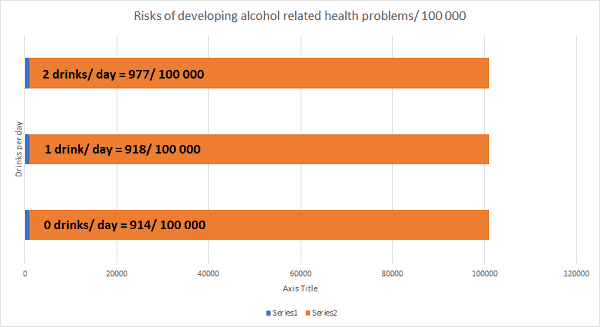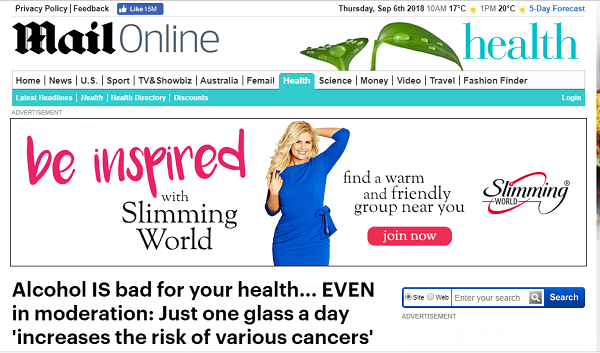
The new 'safe' level of alcohol consumption should be none, at least according to a recent study into the health risks of alcohol published by the The Lancet.
This contradicts the current official government guidelines on the 'safe' level of drinking: currently around 14 units per week for women, and 21 for men.
The findings of this research study were widely reported in the mainstream media:
- The Daily Mail reported that 'just one glass of wine a day increases your risk of various cancers'.
- Even The Independent reported that 'the idea that one or two drinks a day is good for you is a myth'.

But what are the actual statistical risks of different levels of alcohol consumption?
The actual risk of developing a drink related alcohol problem for different levels of drinking are as follows:- No drinks a day = 914/ 100 000 people
- One drink a day = 918/ 100 000 people
- Two drinks a day = 977/ 100 000 people

This means that statistically, there is only a 0.5 % greater risk of developing an alcohol related illness if you have one drink a day compared to no drinks, which hardly sounds significant!
Meanwhile, there is a greater increase in risk if you have two compared to 1 drink a day, which suggests the government guidelines have got this about right!
(NB, despite the headlines, The BBC and Sky did a reasonable job of reporting the actual stats!)
So why did some news papers report these findings in a limited way?
This could be a classic example of News Values determining how an event gets reported: it's much more shocking to report that the government has got its advice wrong and that really there is no safe level of drinking!
Or it could be that these newspapers feel as though they've got a social policy duty to the general public... even if there is only a slight increased risk from alcohol consumption, maybe they feel duty bound to report it in such a way to nudge behaviour in a more healthy direction.
In terms of why some newspapers did a better job of reporting the actual findings: it could be that these are the papers who rely on advertising revenue from drinks companies? Maybe the Mail and the Independent don't get paid by drinks companies, whereas Sky does>?
This post will also be published to the steem blockchain: where you can get rewarded in crypto currency for posting, liking, commenting and so on!
Posted from my blog with SteemPress : https://revisesociology.com/2018/09/06/is-alcohol-really-that-bad-for-your-health/
I saw this somewhere else too, but now I can't remember where, pointing out that no, it's not really statistically significant between "no drinks" and "one drink." I chalk it up to media sensationalism - crazy, misleading, sensational headlines gets eyeballs.
In fairness to the mainstream news, some sources were OK in reporting the small print.
Others not so good!
Posted using Partiko Android
Drink moderately and reporting moderately are not very exciting now, are they?
More worrying, I think, is how these sorts of statistics translate into advice from doctors and nurses who really should know better. I'm insisting on continuing to take a particular medication as, having done an assessment of risk factors as they apply to me, my view is that the benefits outweigh the potential risks. NICE guidelines also say that my opinion is the significant one as long as I am aware of the risks.
However, there is constant pressure from doctors to stop this medication, most recently over research regarding ovarian cancer. When I enquired for detailed information, it transpires that 6 women in 1,000 are statistically likely to get ovarian cancer anyway, and with this medication, it increases the statistical risk to 7 women in 1,000.
It's true, there is an increased risk, but really?
There's a 0.01% greater risk by the sounds of it! Sounds like good odds to me!
Also once you factor in all the other variables particular to you that may not even apply!
Posted using Partiko Android
Exactly!
When you cannot get access to clean water, alcohol is your friend. Alcohol is responsible for millions and millions of humans surviving over thousands of years when they would not have because of pathogens in water. The new study is nonsense. There are benefits, and they definitely outweigh the negatives as long as you drink in moderation and responsibly.
Yes good pint!
Posted using Partiko Android
Sorry I couldn't resist that. You're quite right of course. Widespread in medieval Britain and many rainforest tribes in the form of 'manioc beer'I understand!
Posted using Partiko Android
Great information, thank you. One could argue that a candy bar is most likely worse for health than a can of beer.
Especially if the beer is real ale and the bar an 'edible food like substance', like most of them are!
Posted using Partiko Android
To the question in your title, my Magic 8-Ball says:
Hi! I'm a bot, and this answer was posted automatically. Check this post out for more information.
Hi @revisesociology!
Your UA account score is currently 3.813 which ranks you at #4390 across all Steem accounts.
Your rank has improved 37 places in the last three days (old rank 4427).Your post was upvoted by @steem-ua, new Steem dApp, using UserAuthority for algorithmic post curation!
In our last Algorithmic Curation Round, consisting of 450 contributions, your post is ranked at #111.
Evaluation of your UA score:
Feel free to join our @steem-ua Discord server
Food is getting worse by the day, one's got to drink... :D